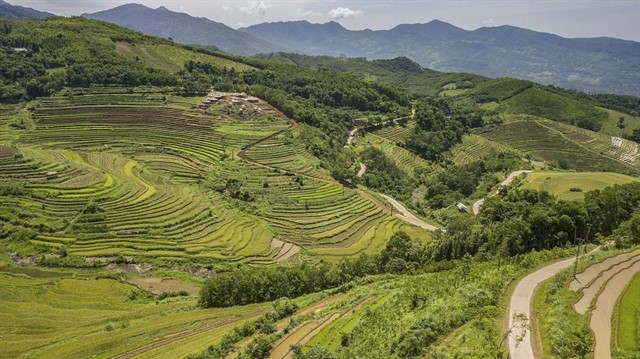The development of agricultural tourism has become a significant focus for Việt Nam, particularly in provinces like Hòa Bình, helping foster green growth and sustainable development.

The development of agricultural tourism has become a significant focus for Việt Nam, particularly in provinces like Hòa Bình, where the integration of agriculture and tourism can play a transformative role in fostering green growth and sustainable development.
Việt Nam’s diverse landscapes make it perfect for agricultural tourism, aligning with the growing demand for eco-friendly travel.
According to a 2023 study by the Institute for Tourism Development Research, most regions across the country are interested in developing agricultural tourism, especially the farmstay model.
Many localities have implemented special mechanisms to facilitate the growth of this tourism type, attracting a large number of visitors and positively contributing to local economic and social development.
At the recent forum on linking agricultural with tourism and green growth hosted by the Ministry of Agriculture and Rural Development and Hòa Bình Province's People's Committee, Nguyễn Thị Lan Hương from the Institute for Tourism Development Research highlighted that agricultural tourism seeks to maximise farming profits while meeting diverse customer needs.
This creates business opportunities for farmers and boosts tourism revenue and destination development.
However, there are still gaps in the legal framework regarding farmstay and agricultural tourism, including laws such as the Tourism Law, Land Law, Forestry Law, Construction Law and Environmental Protection Law, which have not been fully harmonised, limiting the business environment for local people to engage in tourism, Hương said.
According to the Institute for Policy and Strategy for Agriculture and Rural Development, rural tourism development requires a combination of economic, cultural and ecological values. This means that beyond attracting tourists, tourism should contribute to local economic growth while preserving and promoting existing cultural and natural values.
Sustainable rural tourism development will help Việt Nam harness its natural and cultural resources while improving rural communities' quality of life. Key to this transformation are appropriate policies, better infrastructure and enhanced local capacity.
Bùi Thị Nga from the Việt Nam Academy of Agricultural Sciences noted that in some areas, the selection of agricultural tourism sites has not fully considered their potential and unique features, resulting in ineffective results. Most agricultural tourism activities are small, uncoordinated, and repetitive, with unappealing products and no branding.
In some areas, rural tourism infrastructure is inadequate, with limited transportation, weak waste management, substandard toilets, no tourist signage and a lack of clean water.
Nga recommended that agricultural tourism sites be developed based on a proper evaluation of each region's potential, to avoid fragmentation, improve appeal, and build a strong brand for Việt Nam’s agricultural tourism.
Hòa Bình’s potential

Hòa Bình, renowned for its natural beauty and unique cultural identity, rich in traditional festivals and majestic landscapes, including the Hòa Bình Hydroelectric Lake, often called 'Hạ Long Bay on land', is committed to sustainable economic growth.
The province focuses on combining agriculture with tourism, creating a model that supports eco-friendly farming and biodiversity conservation.
Đinh Công Sứ, Vice Chairman of the People's Committee of Hòa Bình Province, highlighted the province's strong potential for developing a diverse, high-value agricultural sector and its focus on green and circular economies.
So far, 80 out of 129 communes have met new rural standards, with 28 achieving advanced standards, one achieving model standards, and 75 exemplary residential areas and 258 model gardens, boosting rural distinctiveness and community-based tourism.
The 'One Commune, One Product' (OCOP) programme, linked to tourism, has resulted in 158 OCOP products in Hòa Bình, including two potential 5-star, 32 4-star, and 124 3-star products. Rural infrastructure has improved, boosting local tourism with services like eco-tourism, community tourism, farm experiences, and craft village tours.
Sứ said that efforts in forest planting, aquaculture and developing clean agricultural products for tourists have been strengthened.
Forest care and protection are priorities, with forest coverage over 51.5 per cent, supporting eco-tourism. The province focuses on preserving nature reserves and forests for eco-tourism. The Department of Agriculture and Rural Development has also developed safe vegetable and fruit areas and integrated livestock farming to provide clean products for tourists.
Sứ said that eco-tourism linked with agriculture is not a new idea and has been successful both in Việt Nam and abroad. However, in Hòa Bình, it is still limited to small-scale models, and turning it into a developed tourism product faces many challenges.
Local communities, authorities and specialised agencies must cooperate, he said.
He also emphasised the importance of support policies for infrastructure, loans, promotion and workforce development to attract investment. Additionally, collaboration between farmers, businesses, local authorities and tourism and agriculture agencies is needed alongside creating value-added agricultural tourism products.
According to Lê Quốc Thanh, Director of the National Agricultural Extension Centre, agricultural support services are key in supporting this shift by teaching farmers sustainable methods that attract eco-conscious tourists.
Thanh said, for agricultural tourism to succeed, farmers must use organic, pesticide-free practices to ensure safe and appealing experiences for environmentally aware travellers.— VNS
- Tags
- Hòa Bình Province





